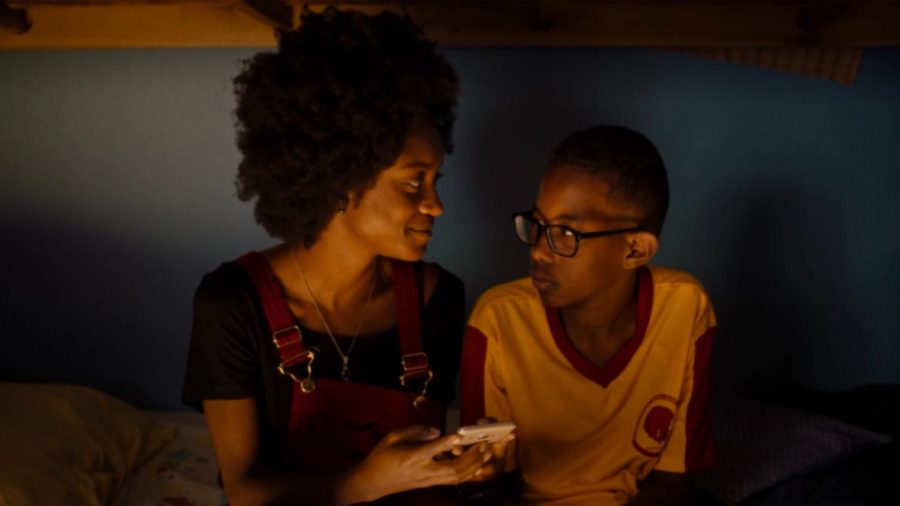Sundance: Gabriel Martins’ ‘Marte Um (Mars One)’ is Rated T for Tender
Still from Gabriel Martins’ film “Marte Um (Mars One) which Premiered at Sundance Jan. 20, 2022. (Courtesy Sundance Institute)
January 22, 2022
Gabriel Martins’ “Marte Um (Mars One)” made its festival debut at Sundance on Thursday, Jan. 20. The film follows Tércia (Rejane Faria), Wellington (Carlos Francisco), Eunice (Camilla Damião) and Devinho Martins (Cícero Lucas) — a Black family of four living in poverty on the outskirts of a major Brazilian city after the election of Jair Bolsonaro in 2018. The family navigates their relationships and personal narratives against the backdrop of economic scarcity and political unrest.
Family Dynamics in an Uncertain Time
The movie opens with a shot of Devinho swinging outside in a hammock as people in the streets chant Bolsonaro’s name into the night. Scenes from day-to-day family life, like dinners together and a birthday party for Tércia, give us a glance at their dynamic. Tércia, the mother, and Wellington, the father, have a loving but very traditional relationship with each other, their preteen son Devinho and college-aged daughter Eunice.
Both Eunice and Devinho are bright, engaged students. Eunice, who is studying law, learns from her professor about the incarcerated population in Brazil and the United States prison industrial complex, becoming well-versed in political and social problems. Devinho learns about geology and watches with fascination as his teacher performs a demonstration of a volcano erupting with baking soda. He dreams of one day joining the Mars One mission.
Tércia works as a cleaning lady and Wellington is a property manager at an up-scale apartment complex. They have friendly relationships with the people they work for, but are underpaid and overworked. In a discussion with a coworker, we discover Wellington has been sober for four years and we watch as he attends alcoholics anonymous meetings.
Slow Burn of Daily Life
As the film progresses, Tércia witnesses a game show prank where a man ignites fake dynamite, pretending to kill himself. She is traumatized by this incident and believes she is cursed after noticing bad things happening to people around her. Wellington pushes Devinho toward a career as a professional soccer player though he wants to be a scientist. Eunice falls in love with a girl and considers getting an apartment with her.
The film builds slowly, giving us time with the characters and allowing them ample room to show their closeness to each other. Conflict quickly unfolds in the tense aftermath of Eunice’s departure and coming out to her parents when Wellington lands Devinho a spot at the tryouts for their city’s professional soccer team the same day Devinho plans to attend a Q&A session with Neil deGrasse Tyson.
Devinho takes fate into his own hands by intentionally crashing his bike and breaking his leg. The same day, Wellington is fired and blows up at his family when he arrives home to find Devinho will not be able to make the tryouts and relapses that night. The family eventually reconciles and the film closes with them looking up at Mars from a telescope Devinho has made from garbage and his grandfather’s old belongings.
Martins’ Vision for the Film
This film was the second feature by Cannes and Clermont-Ferrand veteran Gabriel Martins, who got his start at the Brazilian production company Filmes de Plástico. As a Black filmmaker who grew up in poverty, he said it was important for him to portray a story with hope. “We had this kind of metaphor about the telescope and the way David builds it,” Martins said. “He’s collecting trash and memories of his grandfather … he’s building something from nothing.”
The film is a colorful, expressive love letter to the environment of Martins’ own youth. Every scene is packed with emotion as interpersonal conflict between family members are constructed and then dismantled in a moment of tenderness. The film addresses political tension, queerness, poverty and family dynamics through simple, intimate narratives and in a thoroughly honest and thoughtful representation.
More information about “Marte Um” can be found on the Sundance official website.








